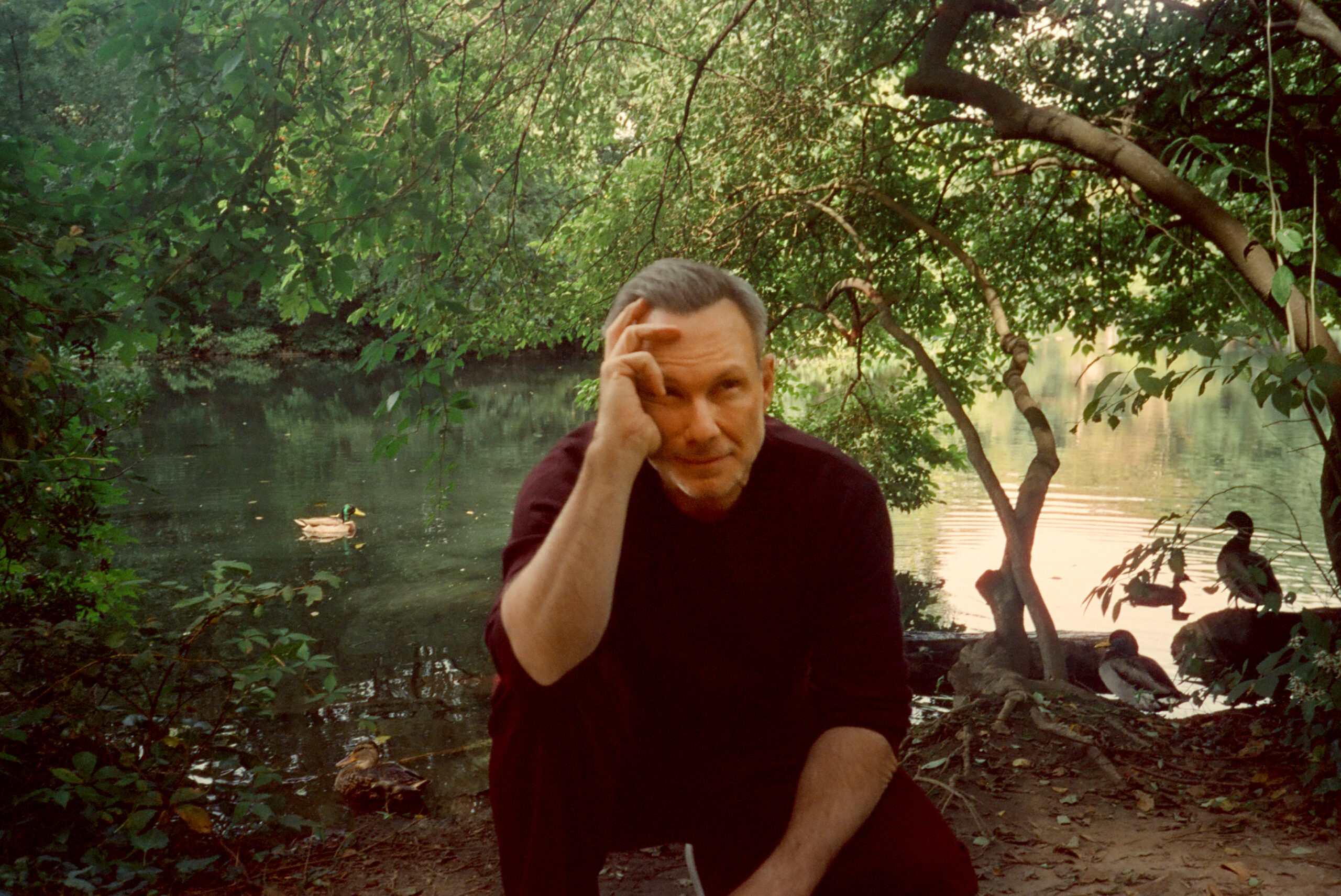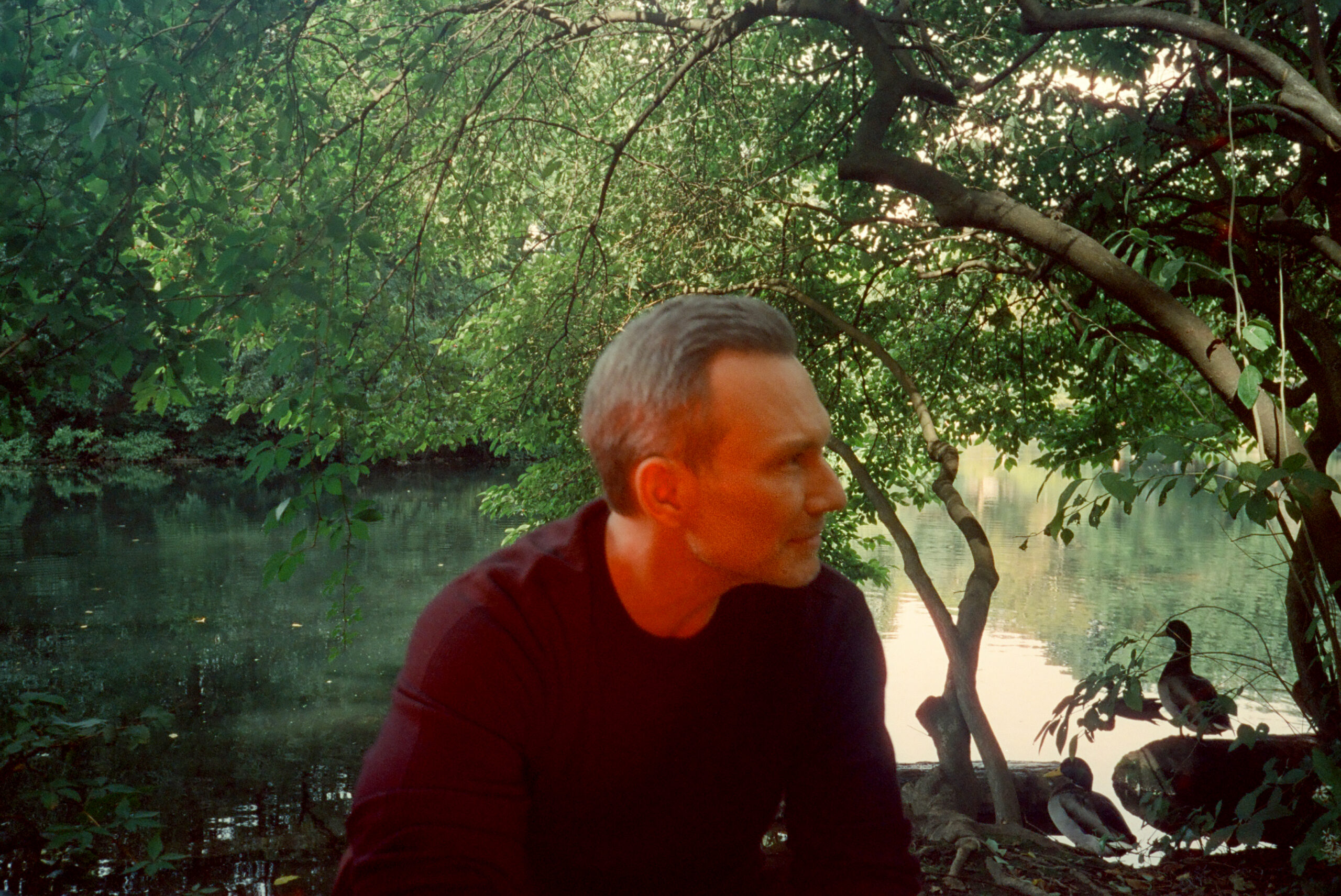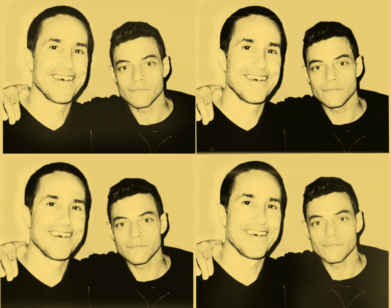IN CONVERSATION
Christian Slater and Rami Malek on Growing Up and Logging Off
It’s been exactly 10 years since Mr. Robot premiered, but when former on-screen hacktivists Christian Slater and Rami Malek reconnected earlier this month, it was as if no time at all had passed. These days, Slater, 55, has traded digital anarchy for bus drop-offs and family dinners, but his dedication to the craft has never wavered. “I probably love it more today than I did 30 years ago,” he confessed. “I don’t really see it as a job; I see it as something that I get to do.” Most recently, he can be heard more than seen in Mary Bronstein’s If I Had Legs I’d Kick You. Slater plays Rose Byrne’s absent and exasperating husband, checking in mainly by phone as his wife Linda suffers one of the year’s most feverish on-screen meltdowns. But Slater, and his famously distinctive voice, remains evergreen. To talk about the film—and the ten-year anniversary of the show that made them one of television’s all-time great duos—Slater and Malek got back in the lab.
———
RAMI MALEK: My man.
CHRISTIAN SLATER: Hey, buddy.
MALEK: How are you?
SLATER: I’m alright.
MALEK: How’s the family?
SLATER: Family’s good. Wife is great. Lena’s getting used to the bus ride to school, and the boy is just frickin’ hilarious. He’s a maniac.
MALEK: That’s no surprise, is it?
SLATER: No, not really. Where are you? Are you in London?
MALEK: I’m in New York. We went late last night, but enough about that, we’re talking about you now. The film is excellent.
SLATER: Did you see it?
MALEK: Yeah, they sent me a link.
SLATER: Jesus, I haven’t seen it.
MALEK: Shut up.
SLATER: No one’s sent me a link. But thanks for checking it out.
MALEK: That’s crazy.
SLATER: I’m sure I could get a link now, but I guess nobody’s thought to send one…
MALEK: Well, they want you to watch it on the big screen.
SLATER: Maybe that’s what it is. The only thing I’ve heard is just how amazing Rose [Byrne] is.
MALEK: Rose is one of those actors—you see her name come up, and you know it’s going to be good. I want to be a part of that. Did you have that same feeling?
SLATER: I did. She’s definitely been somebody that I’ve admired, and she’s married to that Italian dude, Cannavale.
MALEK: That Bobby Cannavale that we worked with.
SLATER: We like him and love her.
MALEK: And then you got [director] Mary Bronstein. What was that experience like?
SLATER: You’re such a good journalist.
MALEK: Am I? I just asked one simple question.
SLATER: Let’s see. Mary is fantastic. I’m just going to talk about how fantastic everybody is. We shot it in Montauk. That place is stunning. To get to be there for a couple of weeks was lovely.
MALEK: What was also excellent is the editing.
SLATER: Oh, good. That’s important.
MALEK: It’s so well-paced, and it has a real thrilling aspect to it. It’s got that labyrinth feel, where you never quite know where you’re going as an audience member. And then to have your voice coming in and being this—no pun intended—little anchor out there at sea was quite lovely. What was that like?
SLATER: It was really the only way to have played those scenes. The husband is absent physically and, I suppose, emotionally, trying to understand what she’s going through, but it’s impossible to do that when you’re unable to actually be there. It probably helped not being there—it put a great deal of distance between Rose and me, and just listening to the chaos she was going through felt extremely disconcerting. I worked with Mary and Rose to get the right tone for all those scenes. They’d be filming, and I would call in from wherever I was, and we’d do the takes. Mary wanted the scenes to feel as authentic as possible. I’m playing a father whose job takes him away from his family and Rose’s character. She’s forced to deal with her sick child, which would already be difficult, but this child is unwell in a way that takes everything in a deeper, more difficult direction. He doesn’t really know the situation she’s in. So when you’re speaking to somebody on the phone like that, who thinks, “Oh, come on, you should just go down to the pool and have a great time,” that would probably drive you insane. We travel for work, and I’ve had these kinds of moments where I haven’t been able to be there at an important time. Brittany [Lopez] gave birth to our son while she was in New York and I was working in L.A., so I missed that occasion.
MALEK: I remember that moment, and I thought that must’ve been quite frustrating. But at the same time, you guys always find a way to make that work. It’s a relationship that I’ve constantly looked upon with great admiration. But you’re right—it’s frustrating for Rose’s character that she’s reaching out for someone to help in such distress and sometimes he’s just making things worse.
SLATER: It’s horrible that he’s not there. We shot a couple of different endings, too. I’m very curious to see what Mary has chosen as far as the ending goes.
MALEK: I found it so impactful, not just because I know you.
SLATER: It’s weird to get older and start playing these types of characters that are adults. It’s just crazy.
MALEK: When was the first time you started recognizing the transition?
SLATER: Possibly when we worked together on Mr. Robot. A couple of people even said it to me. When I did The Name of the Rose with Sean Connery—obviously Sean Connery was a phenomenal example—and I never thought I would be in that kind of position. I’ll just say, on Mr. Robot, it was a weird feeling to be what Sean Connery was to me in The Name of the Rose. But I think Mr. Robot was certainly the start of that kind of journey.
MALEK: Maybe I told you this in text but my mom, when she saw a picture of us the other day, said, “He hasn’t aged a bit.” So there you are, my darling.
SLATER: Oh my god, I love your mom.
MALEK: She adores you. Always has, always will.
SLATER: How lovely.
MALEK: Were there any moments where you guys got disconnected? I’m sure Mary, as you said, wanted it to happen in real time. That’s not always easy to accomplish.
SLATER: I always tried to make myself as available as I possibly could, and there were moments—not where we got cut off—but where Rose would throw the cell phone down and forget that I was down there.
MALEK: Wait, as an acting choice?
SLATER: No, I think she’d forget to turn the phone off in the middle of the scene and just throw it down. So then I could hear the conversations between her and Mary—talking about their performance, what Mary wanted her to do with her performance, and what they were wishing I had done with mine. No, I’m just kidding. [Laughs]
MALEK: I thought you were being real for a second. I was like, “Did you eavesdrop, or did you feel like you were listening to a conversation you weren’t privy to?”
SLATER: Yes, exactly. I was definitely eavesdropping. What was I supposed to do? I couldn’t hang up. I had to be there. I didn’t want to lose the connection.
MALEK: Did you stay on the phone? Did you put it down and walk away, but stay within arm’s distance? Very specific, but it’ll say a lot about you.
SLATER: Dude, I stayed on the phone. [Laughs]
MALEK: Got it. [Laughs]
SLATER: Every now and then I’d go, “Hey, I’m down here.”
MALEK: “I’m stranded out here.” Which begs a good question: do you ever listen to Desert Island Discs? Is that a British thing?
SLATER: I think it might be a British thing. I’m not sure.
MALEK: As soon as we get off this, everybody listening or reading should go hit up Desert Island Discs. They ask questions like, “What would you take if you were stranded on an island?”
SLATER: So if it were a Castaway-type situation, what would I wish I had? Honestly, the first thing that comes to my mind is that I’d want a photo of my family, so I could see them and hopefully feel less alone.
MALEK: Oh, that’s really sweet. Maybe that’s something you start carrying with you every day.
SLATER: Yeah, you’re right. I’ve got my phone, and now I’m not surfing the web or doing any of that stuff. The only thing I end up doing is looking at pictures.
MALEK: You told me that, because you used to be quite the political junkie.
SLATER: Oh god, what a waste of time. I don’t have any idea what’s going on now, and I’m so much happier because it’s all so crazy. I had that phone thing I was going to show you, but then Brittany found this device called The Brick. Did I tell you that?
MALEK: Yeah, but go on, tell our readers.
SLATER: You can brick your phone and cut off any kind of browser or TikTok or all that stuff, anything that could send you into a rabbit hole where you start surfing, and then it’s three hours later and your life is gone. It cuts all that stuff off, and it’s been wonderful. Now I pretty much focus on what’s going on in my own home. I just don’t think we’re meant to have all that information thrust upon us every moment of every second of every day. It’s too much.
MALEK: It’s too much. I always feel the same way. Just because we have these devices, we’re all expected to respond immediately. And if we don’t, are we considered bad friends?
SLATER: Yeah, we don’t need to respond. Not everybody needs to know our opinions.
MALEK: Most of the time, they don’t need any opinion whatsoever. They’ve already made up their minds anyway.
SLATER: Exactly. So I spend a lot of time just looking at photos of the family because that’s fun. I also spend a lot of time, obviously, looking at them in real life, so that’s good.
MALEK: The family’s growing. I cannot wait to see them.
SLATER: It’s been hilarious.
MALEK: I’ll come over soon.
SLATER: It’s a very funny bunch.
MALEK: Yeah, I bet. Very eclectic. Never a dull moment.
SLATER: There’s a number of things you’ll see. I can’t go into it.
MALEK: Something I actually thought about when we were talking about being stranded… If you had to be at sea, and you had one person to be with—and it can’t be a family member—how about a past character, who would you be stranded with?
SLATER: It would probably be Mark Hunter, from Pump Up the Volume. I liked him, and I liked that movie, and I loved all the people involved in that project. I was just very happy when I was making that movie.
MALEK: That’s nice. Which of your films would you say you appreciate or love the most?
SLATER: I think it’s always been Pump Up the Volume. Again, I love everyone who’s involved, and I still love them all to this day. I feel like we made something very special together, and I remember being very happy on the set.
MALEK: I’ve been with you in many interviews where you’ve brought that up, so that’s remained one that has been incredibly consistent for you.
SLATER: It was the next movie I did after Heathers, and it had a depth to it that I really appreciated.
MALEK: So you felt some evolution?
SLATER: Yeah, right. I liked the vulnerability of it. Where in Heathers, I was just a real madman—pretty much a psycho killer—and it was nice to play a young man struggling with the FCC and issues of that nature, and trying to expose injustice, very much like Elliot [Malek’s character in Mr. Robot].
MALEK: Yeah, I was just going to say. Heathers wasn’t an immediate hit. How did you feel after that?
SLATER: Heathers was definitely under the radar, kind of cool, and not considered successful at all. I didn’t really feel a great deal of pressure to outdo something. Pump Up the Volume was, like, the next script that I read, and I just thought, “Oh, this is great.” Then I met with the director, Allan Moyle, and thought he was an interesting, eccentric character, and then it all just came together.
MALEK: When was the first time you started to get not just recognized for your work, but recognized publicly, and how did that affect you?
SLATER: Fame is a weird phenomenon. There were certainly lots of eyes on me, but there were less sophisticated recording devices, which is fantastic. Fame can be great and comes with unexpected challenges. It’s fun and strange to be recognized sometimes, and to be treated as someone more special than someone else in the room has never made me feel comfortable. And it’s weird to be presented with boundary-less opportunities. Boundaries are important things to have in order to maintain sanity and reality.
MALEK: I could not have said it better myself. I remember meeting you for Mr. Robot and being quite starstruck, and I was quite taken aback by how humble, kind, and generous you were. Of course, I had seen all of your work, so I was also a huge fan, but to be in the room with you, it feels special. So I can understand how someone can fan out over you, but it didn’t throw me. You’re very disarming and charming, to a point where I thought, “This cannot be genuine,” but what I discovered is that it is. You really are who you are, and that is a rare quality in a human being who is often asked to present. So I’ve always appreciated that about you. Another really genuine moment in public came at the Globes, where I was present for you winning for our show, Mr. Robot, but in your speech, you reminded everyone that you’d been in this business for 40 years—which, standing up there looking so youthful, I think everyone was quite taken aback by that.
SLATER: Wow, really?
MALEK: At least I know I was. Do you remember that? I remember it quite vividly.
SLATER: There are things I remember. I remember I embarrassingly screwed up and forgot to say thank you to my wonderful leading man.
MALEK: I forgot that part, and I don’t care. I thought you were going to say Brittany or something.
SLATER: No, I said Brittany, thank god. I was so nervous about forgetting to say Brittany that that was the only thing I could think of.
MALEK: Have I ever struck you as the person who would care about something like that?
SLATER: Not at all.
MALEK: Then put it behind you.
SLATER: I’m going to put it behind me.
MALEK: We shall never speak of that again, because I give zero Fs. I’m glad you were up there.
SLATER: Good. I care.
MALEK: You do. It was a beautiful moment to witness.
SLATER: That was a fantastic night. I felt great for maybe four or five days. I don’t think it changed how I thought of myself, but it was a nice high for a few days, which I really enjoyed. But then life begins to creep back in and you remember you have to get up and walk the dog in the morning—that type of shit.
MALEK: I hear you. I often get asked that question, and there’s never a real answer for it, and I worry that sometimes younger actors put that on a certain pedestal—as a certain achievement for what we do—and I think if that’s what you’re in it for, we have a serious issue to start with. What advice would you give to people of a younger age?
SLATER: Well, time is definitely something. Just enjoy every moment, don’t take anything for granted. I think what we get to do, it’s a very special job, so delve into it as deeply as you can, and at the same time, don’t take yourself too seriously.
MALEK: That’s great. I’m doing something right now, and I have to keep reminding myself to stop taking myself so damn seriously. What do you love about acting today that you did not perhaps love 30 years ago?
SLATER: I probably love it more today than I did 30 years ago. My brain hadn’t fully formed when I was starting out as a young man. My hippocampus hadn’t settled in yet, but now that it has, seemingly, I really do appreciate the gig. I love bringing words and characters to life. I don’t really see it as a job; I see it as something that I get to do.
MALEK: I’ve heard that recently as well, and I start thinking about that. We get to do this.
SLATER: I mean, it’s crazy. It’s a nice way to also take a break from myself as well—to be able to immerse myself into somebody.
MALEK: What have you enjoyed more: your early success, or, I guess, perspective—or wisdom, or whatever you want to describe it—that comes with a certain sense of longevity?
SLATER: Early success was a blast at times and incredibly challenging, and I think I prefer the perspective now—to be able to look back in retrospect and see why things may have gone the way they did—which helped lead me to the life that I love and cherish today. You discover nothing happens by accident. And as far as fame goes, I’m in a pretty good place with fame. Most of the time, I basically get to live my life pretty normally, with the occasional shout-out from a doorman as I’m walking by, or as a truck driver passes. Someone might yell out the window, mentioning a movie or TV show they’ve enjoyed. Earlier, it was more intense, and that was harder. Being younger, that was pretty crazy. And the roles that I enjoy playing have changed over time. I used to not want to play bad guys or be killed on screen. Now I enjoy playing bad guys, but I still don’t like dying.
MALEK: I think a lot of actors feel that way. We have our limits, I suppose.
SLATER: That’s right. I just don’t like the dying part.
MALEK: [Laughs] Sorry.
SLATER: I was already dead when we worked together. That made it a little bit easier.
MALEK: Spoiler alert. We have our anniversary coming up in 10 years. How do you feel about that?
SLATER: October 9th, right?
MALEK: Yeah.
SLATER: What the hell.
MALEK: I know. Well, congratulations to you, my friend.
SLATER: You too.
MALEK: There you have it. Alright, I’ll come see you soon.
SLATER: Buddy, come over for dinner.
MALEK: I will. Have a great day, my man.
SLATER: You too, buddy.






